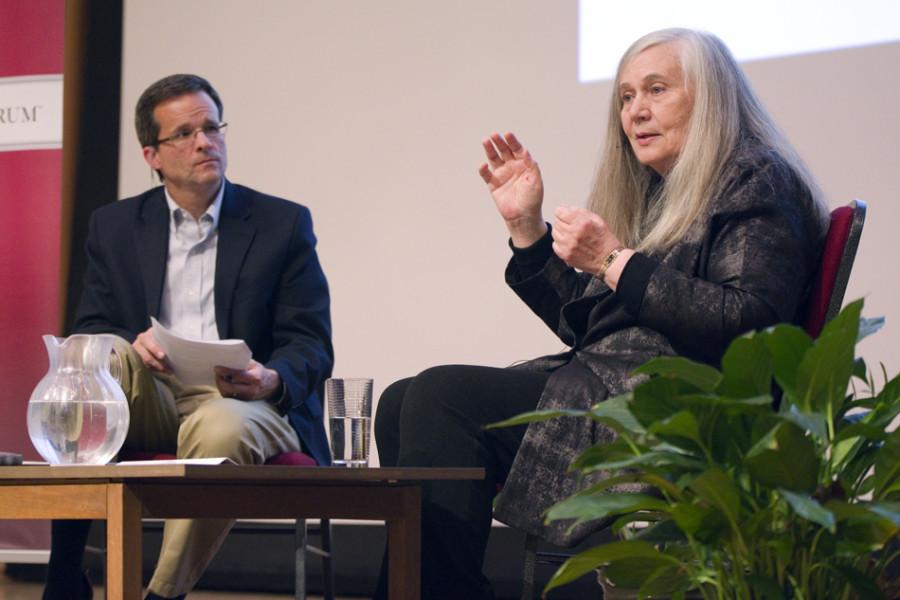Pulitzer Prize-winning author discusses beauty, science, religion at The Veritas Forum
Sylvana Caruso/The Daily Northwestern
Author Marilynne Robinson and University of Pennsylvania professor David Skeel discuss beauty, science, religion and the writing process Wednesday. Robinson, a Pulitzer Prize-winning author, spoke at this year’s The Veritas Forum.
April 16, 2015
Pulitzer Prize-winning author Marilynne Robinson explored the ways humans respond to the universe’s beauty through theology and science Wednesday before a packed audience in Ryan Auditorium at this year’s The Veritas Forum.
The Veritas Forum, a group of several Christian campus ministries, hosts a speaker event each year followed by a Q&A session and discussion groups. The speaker focuses on a topic of relevance for the Christian community.
During her speech, Robinson discussed the multiple ways societies interpret beauty, not only in humans but universally. She described how sometimes humans struggle to find an exact definition of what they think is beautiful because there are many standards of beauty, both within and outside the realm of spirituality.
“The idea of beauty varies from one receiver to the next, one decade to the next, one culture to the next,” she said.
However, she said humans have the capability to acknowledge beauty, even if it doesn’t fit their own definitions.
“Sometimes, with a little instruction, we recognize varieties of beauty we could never otherwise approximate or even imagine,” she said. “If existence were designed to immerse us into the world, to charm and engage us, what could be better suited to accomplishing this than beauty, with its inexhaustible openness to variation?”
Robinson said science and theology agree that reality encaptures a series of moments that cannot be repeated and that this causes beauty in our world. She cited the scientific theory that believes any number of universes are possible.
“God’s freedom is expressed in what is usually called miracles, but I think the world and human experience itself should be valued as miraculous as well,” she said.
Following her speech, Robinson sat down with University of Pennsylvania law professor David Skeel, who interviewed her about her novels, writing process and ideology.
Robinson’s novel “Gilead,” which won the Pulitzer Prize for Fiction in 2005, chronicles the story of a dying congregationalist pastor and sparked a debate on Christian multiculturalism and the representation of Calvinism and Puritans in literature and society.
During the interview, Robinson said her life has not changed much since she gained international fame through her novels and that she remains “a solitary creature surrounded by many books.”
Robinson said Christianity has been a large part of her life for as long as she can remember.
“I’ve always been fascinated by the scripture,” she said.
However, Robinson said she never worried about her Christian faith intervening with her writing, saying that she writes about what interests her and that she was impressed by the popularity of “Gilead.”
“These books have a global audience that I certainly never anticipated,” she said.
Luke Miedema, Northwestern’s Reformed University Fellowship campus pastor and organizer of the event, said Robinson is thoughtful and articulate.
“She’s a woman of deep faith and we just thought she’d be a fantastic voice to give a clear and compelling explanation of Christianity and how it affects us in the world,” he said.
McCormick freshman Samuel Lobo said he found Robinson’s philosophical views very interesting.
“You can tell she’s a writer just by the way she thinks so philosophically, so circularly,” he said. “She had some really interesting points about suffering and beauty, about how our humanity nowadays is not experiencing the world like most humans in history have experienced it.”
Email: marianaalfaro2018@u.northwestern.edu
Twitter: @marianaa_alfaro



